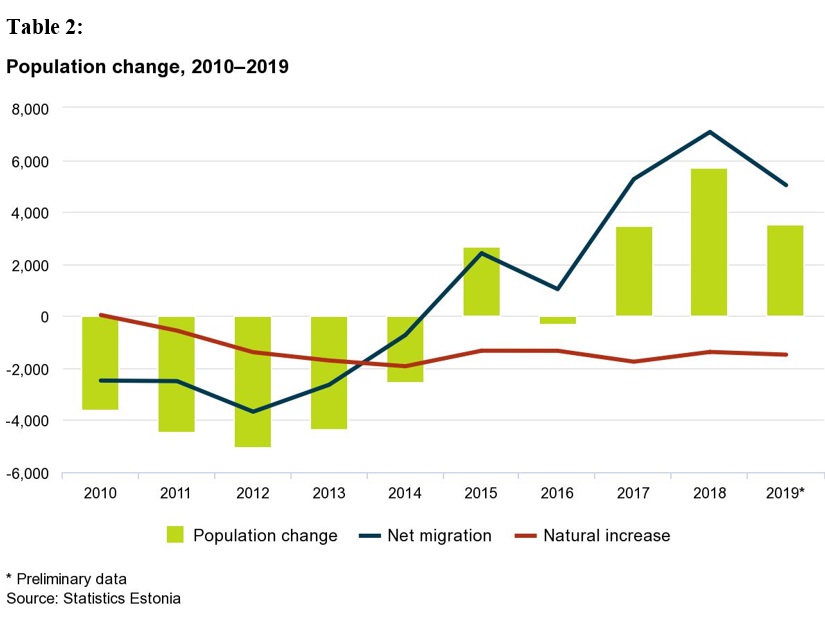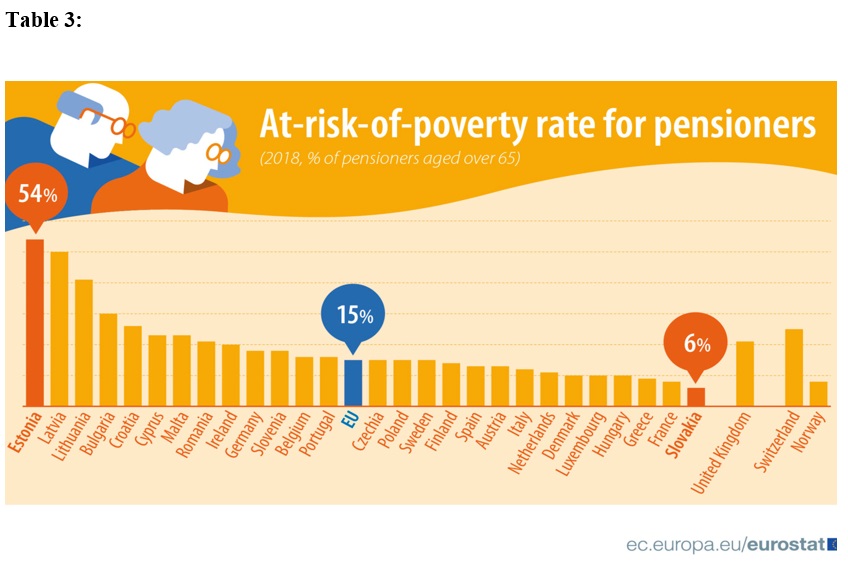Weekly Briefing, Vol. 25, No. 2 (EE), January 2020
Estonian economy: forecasting 2020
Experiencing a relatively stable trend, from 2017, the population of Estonia is growing (see Table 1). Even though the discussion is about 1,328,360 people on 1 January 2020[1] (only 3,540 persons more than at the same time a year ago), this particular indicator represents one of the most important morale-boosting factors for any nation and for any economy.

However, when the figures are looked at in analytical details for 2019, “the more deaths than births” and “negative natural increase” were predicted and then detected, and the “factor behind population growth […] was positive net migration: 5,030 more people immigrated to Estonia than emigrated”[2]. This bit of data helped to solidify the argument that ‘external immigration’ as a factor has been continuously driving the Republic of Estonia’s population growth for five years in a row (see Table 2).

As a usual consequence, indirectly, a population growth leads to a certain positive development in terms of new business initiatives – during 2019, it was indeed the case for Estonia. As reported, in total, 24,291 new businesses and self-employed persons were registered in the country, which represented a bit more than 4% increase, as compared to 2018[3]. In the context of Estonia, which has been promoting its e-residence programme for years, the ‘new businesses’ theme has a chance to be ‘coloured up’ using the Brexit-associated ‘motif’. For example, as reported, the current figure of British citizens who hold Estonia e-residence stands at 3,100, which is three times higher than it was on 29 March 2017[4]. As quoted in Estonian media, Ott Vatter, Managing Director at e-Residency, noted that
More than a third of the British entrepreneurs surveyed said they were considering leaving the country or relocating their business. […] The e-residency program[me] will help British businesses and maintain their access to the European single market without them having to physically leave their home country. […] In addition to raising awareness of the e-residency program[me], the campaign brings a lot of positive attention to the state of Estonia as a whole.[5]
However, even a sizeable group of British e-residents, ‘virtually’ coming to Estonia to do business, is not something that the Estonian Government is (or should be) counting on, in order to maintain a well-balanced economy. The country’s own loyal citizens, more specifically – their life after retirement – is (and should be) a matter of particular concern for the Government. In a way, it has already become treated by the Ministers as such, since the current governmental coalition has been onto pension reform for few months. As a result, on 29 January 2020, The Compulsory Funded Pension Reform Act was passed at the Riigikogu, making “membership of the so-called second pillar of the Estonian pension scheme, which deals with employee contributions, voluntary, where it had previously been mandatory”[6]. There were few reasons outlined by the Government before proposing this important change, but, most probably, considering the obvious direct consequence of adopting this particular law (many people will be taking their saved pension funds form their accounts, and the economy will get a certain push for revitalisation), there was a significant macro-economic factor behind the law adjustment. Unfortunately for the Estonian Government, the story does not end here, and it will have a lengthy continuation in 2020.
On a high number of occasions, Estonia is positively leading the EU (and even the world) in different tables, grids and charts. At the same time, as reported, there is also a list where Estonia would definitely prefer featuring somewhere below, rather than popping up right at the top of it (see Table 3). Having comprehensively analysed the EU-wide data for 2018, Eurostat, which is a major Directorate-General of the European Commission, pointed out that about 54% of Estonian pensioners aged over 65 are at risk of poverty[7]. This is the worst result across the EU, especially when the entity-wide average is 15%. Speculatively, some local commentators have already expressed their serious concerns about the aforementioned adopted law – with the prime argument being that if many people will be allowed to take some of their pension-associated savings now, it will make them poorer when they will have reached the age of retirement.

In a significant addition, Ülle Madise, the current Chancellor of Justice, was more precise in making her point very clear – the pension reform is not lined up nicely with the country’s Constitution. In her letter to the Riigikogu, Madise stated
People who have joined mandatory funded pension withdrawing their savings would cause the social tax burden of comparable groups to change retroactively. People who have not joined the second pillar will have borne greater social solidarity than those who joined the second pillar and can withdraw savings before reaching retirement age. That is why people who have the second pillar will be given an advantage in the extent of 4% of their social tax contribution that can be optimized retroactively compared to people 20% of the social tax paid by whom has always reached the national pension system. […] Fundamentally changing collection period rules – allowing people to withdraw and take assets with them during the collection period – creates the risk of tying the value of fund units, in addition to events on financial markets and the global economy, to the behaviour of other unit holders to a considerable degree.[8]
Upon receiving the letter, the Riigikogu members started expressing their opinions on what Ülle Madise had to say. The most awaited commentary was from Helir-Valdor Seeder, the head of Pro Patria, a coalitional partner that was behind the reform. Seeder noted that, in her letter, the Chancellor of Justice went beyond her commission, content wise (calling it “largely political”)[9].
Most definitely, the Chancellor of Justice’s opinion – it is usually taken with full seriousness by all political actors in the country – has had an impact on how the Estonian President has formulated her own reaction on the discussed normative act. Having considered all options, Kersti Kaljulaid vetoed the law, returning it to the Riigikogu for revising. Certainly, the country’s President had something to say, explaining her decision, which will be, no doubts, further jeopardising her rocky relations with the current Government:
I analysed [the law] strictly from a constitutional point of view. What I think about the reform is inconsequential. It is the [P]resident’s duty to exercise control over the legal environment. The bill at hand infringes on the Constitution enough to warrant returning the bill to the parliament. […] It is clearly a tax for the purpose of pension and national health insurance. If these sums are withdrawn, it clearly alters the purpose of the instrument. And that is unconstitutional.[10]
Getting a compelling reform finalised from the beginning of the process until the adoption of the change is, probably, not something that the Second Ratas Government can give themselves a credit for. This time, when it appeared to be a reform the Estonian Government wanted to present as a promise to the electorate being ticked off, it did not work either. In the context of this important law, which was decisively rejected by the President, the algorithm for further actions is as follows: the Riigikogu is either to amend the reform or pass the law as unchanged again. If the latter situation is to be detected, then the political ‘ball’ will be on the Kersti Kaljulaid’s ‘court’ – she can sign it up to proclaim the law or simply forward it to the country’s Supreme Court. There is a high degree of probability that this situation will make a significant impact on other economic initiatives of the current Government – for example, the stumbling governmental pharmacy reform, which has been widely discussed but never got off the ground, is likely to be revitalised in the first part of 2020[11]. With necessity, it will mean that, largely, the agenda on certain policy adjustments, which the current governmental coalition formulated back in March-April 2019, will be pulled through to 2020.
[1] ‘Population at beginning of year’ in Statistics Estonia, 17 January 2020. Available from [https://www.stat.ee/stat-population-at-beginning-of-year].
[2] ‘Immigration has been driving population growth for five years’ in Statistics Estonia, 17 January 2020. Available from [https://www.stat.ee/news-release-2020-007].
[3] ‘More than 24,000 businesses created in 2019’ in ERR, 5 January 2020. Available from [https://news.err.ee/1020479/more-than-24-000-businesses-created-in-2019].
[4] ‘Number of UK Estonian e-residents triples following Brexit’ in ERR, 7 February 2020. Available from [https://news.err.ee/1032800/number-of-uk-estonian-e-residents-triples-following-brexit].
[5] Ott Vatter in ‘Number of UK Estonian e-residents triples following Brexit’.
[6] ‘Pension reform bill passes Riigikogu vote’ in ERR, 30 January 2020. Available from [https://news.err.ee/1029434/pension-reform-bill-passes-riigikogu-vote].
[7] ‘В Эстонии самая высокая в ЕС доля пенсионеров, которым грозит бедность’, ERR, 8 February 2020. Available from [https://rus.err.ee/1033065/v-jestonii-samaja-vysokaja-v-es-dolja-pensionerov-kotorym-grozit-bednost].
[8] Ülle Madise in ‘Justice chancellor: Pension reform raising questions regarding constitution’, ERR, 22 January 2020. Available from [https://news.err.ee/1026773/justice-chancellor-pension-reform-raising-questions-regarding-constitution].
[9] Helir-Valdor Seeder as cited in Loora-Elisabet Lomp, ‘Helme and Seeder accuse Madise of bias’, Postimees, 24 January 2020. Available from [https://news.postimees.ee/6880557/helme-and-seeder-accuse-madise-of-bias].
[10] Kersti Kaljulaid in ‘President did not proclaim pension reform law’, ERR, 7 February 2020. Available from [https://news.err.ee/1032899/president-did-not-proclaim-pension-reform-law].
[11] ‘Rural pharmacies appeal to EKRE to stick with planned pharmacy reform’ in ERR, 8 February 2020. Available from [https://news.err.ee/1033088/rural-pharmacies-appeal-to-ekre-to-stick-with-planned-pharmacy-reform].
